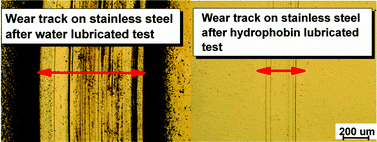Hydrophobin proteins (also known as fungal adhesion proteins) adsorbed and formed a lubricating monolayer film on a stainless steel surface.

The protein layer that was formed on the steel significantly reduced the friction and wear on the two steel surfaces. A higher water content in the film could be achieved by attaching a carbohydrate moiety to the protein, which resulted in a decrease in the friction and wear on the steel. The water content could be controlled by varying the conditions.
Simply register to download the full article for free:
Adhesion and tribological properties of hydrophobin proteins in aqueous lubrication on stainless steel surfaces, Timo J. Hakala, Päivi Laaksonen, Vesa Saikko, Tiina Ahlroos, Aino Helle, Riitta Mahlberg, Hendrik Hähl, Karin Jacobs , Petri Kuosmanen, Markus B. Linder and Kenneth Holmberg, RSC Adv., 2012, DOI: 10.1039/C2RA21018E
Stay up-to-date with the latest content in RSC Advances by registering for our free table of contents alerts.










